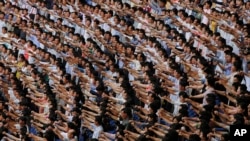North Korea’s rejection of an Iran-style nuclear agreement could indicate the Kim Jong Un regime is counting on China to eventually break with the United States over the severe economic sanctions imposed on Pyongyang.
Daniel Pinkston, a North Korea analyst with the International Crisis Group in Seoul, said Pyongyang has made the political calculation that the U.S. cannot sustain indefinitely broad international support, especially from China, for punitive measures against North Korea.
“Pyongyang has placed its bet. They believe they can play the long game and sanctions fatigue will set in and eventually the rest of the world will give up,” said Pinkston.
North Korea’s Ambassador to the United Nations Jang Il Hun reiterated his country’s position Tuesday that its nuclear weapons program is vital to protect national security and sovereignty against the threat of a nuclear attack or invasion from the United States.
“We will not give up our nuclear weapons and the mission of our nuclear forces will never change as a long as the hostile policy of the United States remains intact," Ambassador Jang Il Hun said.
China Pressure?
At the same time, North Korea is also apparently attempting to improve its ties with Beijing, which have deteriorated somewhat since Kim Jong Un took power in 2011.
The young leader has yet to visit Beijing, his country’s most important ally, biggest trading partner, and main source of food and energy.
China officially broke with North Korea in 2013 by supporting U.N. sanctions against Pyongyang after it conducted its third nuclear test.
This week the North Korean leader paid tribute to Chinese soldiers who fought for the North in the Korean War. Also Chinese President Xi Jinping visited Chinese cities bordering North Korea, which was seen by some analysts as a move to improve ties with Pyongyang.
Prior to the Iran nuclear agreement, U.S. Secretary of State John Kerry said Washington and Beijing were discussing the possibility of new punitive measures to pressure Pyongyang into reentering six party talks to halt North Korea’s nuclear program.
Some North Korea analysts have expressed skepticism that Beijing would increase pressure on Pyongyang, because it could lead to more North Koreans crossing the border in search of food and employment, hurt Chinese businesses operating in the border region, or even threaten the stability of the Pyongyang regime.
North Korea’s increased border trade with China has helped improve the economy and stabilize the Kim Jong Un regime. Pinkston points out that while China would like to see a nuclear free Korean peninsula, it does not want to instigate a popular uprising that could spread beyond its borders.
“Throwing the bums out in Pyongyang could give people the wrong ideas in China,” Pinkston said.
Readying More Missile Launches
Pinkston said the U.S. envoy Sydney Seiler who is visiting the region this week is likely trying to maintain the status quo of support for sanctions from Beijing rather than strategizing on how to significantly increase pressure.
North Korea, meanwhile appears set on continuing to defy the international community by reportedly completing upgrades to its main missile launch facility.
The U.N. bans Pyongyang from testing ballistic missiles, but the North Korean Ambassador to the United Nations recently did not rule out the possibility that it could test fire an advanced ballistic missile in October.
VOA Seoul Producer Youmi Kim contributed to this report.





